Deborah J. Ross's Blog, page 47
August 24, 2020
Newsletter: From Darkover to Zucchini Pickles

My dear friends,
When I began this newsletter, I promised I wouldn't deluge your Inbox. I wanted to send you mindfully curated nuggets of news (and kitten photos). I suspect that under the influence of pandemic brain, I've veered too far in the opposite direction. I've run the risk of being downright taciturn. Nowadays, though, keeping in touch has become more important than ever. So here are news and other goodies. Please let me hear from you in turn!

Collaborators available for pre-order!
Collaborators is all set for a release date of October 1, 2020. It will be available in a range of formats, most of which can be pre-ordered:
Amazon (ebook and trade paperback)
B & N (ebook, trade paperback, and hardcover/laminated cover)
Kobo
and other ebook retailers...
Or ask you bookstore to order through Ingram:
Trade paperback: 9781952589003
Hardcover/dust jacket: 9781952589027
``````````````````````I'm setting up a blog tour for the week of the book's release (October 1). If you would like to review it, please let me know (which ebook format you prefer). For a limited time, it's also available through NetGalley.
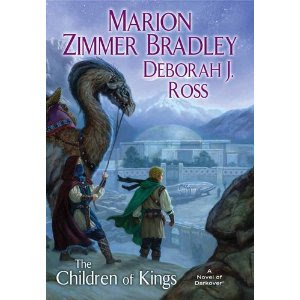
What's new in the world of the Bloody Sun?
A Heat Wave in the Hellers, a collection of my own Darkover short fiction, reprint and original, continues selling well. It's available in ebook and trade paperback formats from Amazon, Barnes and Noble, other ebook retailers, and your friendly independent bookstore. It's also available through Overdrive, so if your public library subscribes, you may be able to read it there, too.
I reduced the price of the ebooks from $6.99 to $2.99 as part of #StayHomeAndRead, and plan to keep the price at that level.
~~~~~~~
I had hoped to give your further news about release dates for The Laran Gambit (temporary title) and Arilinn (which I'm 3/4 through the first draft), but alas, the pandemic has affected publishing in many ways, so right now my editor is looking at 2022 and 2023. I'll keep you posted as the schedule firms up.
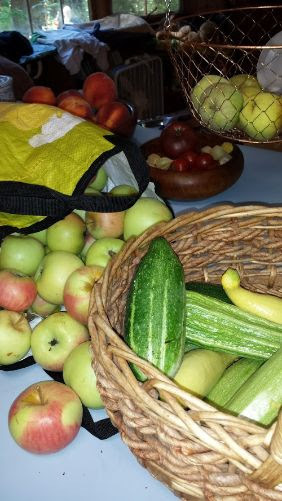
Summer bounty, or -- What do I do with all the zucchini?
It is a truth universally acknowledged that everyone with a garden must therefore grow too much zucchini. (I use the term loosely for any of many varieties of summer squash -- pictured above, with the single cucumber, yellow crookneck, Romanesco/"steampunk," light yellow Clarimore, and Astia, a smallish green zucchini.
We eat it, raw and cooked, and I chop and freeze it (for soups, as the texture suffers). Zucchini egg foo young, zucchini lasagna, zucchini "ribbons" in place of pasta, what else?
Zucchini pickles! (Shown here with frozen and dried apples, and a jar of dried catnip). My family loved these, so the next batch I'll can properly in a boiling water bath. But here's a quick, easy version for you to try.
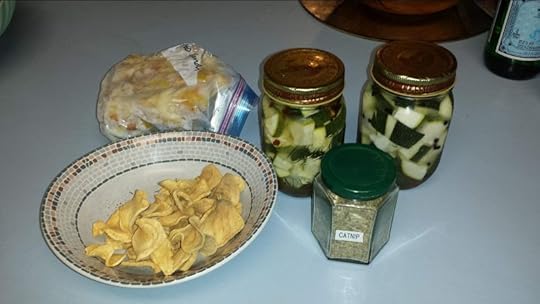
`````````````````````
Refrigerator Zucchini Pickles
1 lb zuccchini, cut or sliced as desired
1 tsp peppercorns or pickling spice
1 c white vinegar
1 c water
1 T coarse-grained salt
Place the zucchini and spices in heatproof jars (I used pint canning jars). Make brine by mixing vinegar, water, and salt in a pan and boiling it to dissolve salt crystals. Pour over squash. Cover, let cool, and refrigerate at least 4 hours before enjoying. They keep in the refrigerator about a month. If they last that long.
You can also use this quick method for other vegetables, like cucumbers, asparagus, green beans, cauliflower...even jalapenos. Or a mixture thereof.
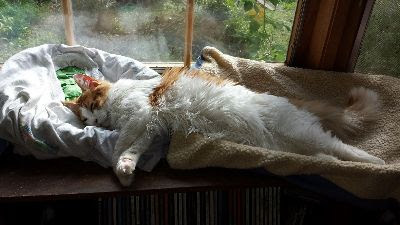
Last but not least, a word from the kittens. Now almost 2 years old, (Red) Sonja takes a break from the summer heat. You'll notice that although she is a small cat (just a tad over 7 lbs) she manages to occupy two baskets.
Stay cool, everyone!




August 21, 2020
"Fire Season," Guest Story by Anne Leonard
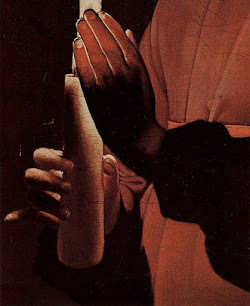
She and I independently thought of this story. It's posted here with her permission. If you enjoy it, check out the rest of the anthology.
Fire Season
By Anne Leonard
Ash floats softly down like snow. My eyes are swollen and stinging from smoke, my throat raw. The sky is a murky yellow-grey, the sun a dull copper through the haze. I am taut with readiness. I was one of a dozen people to climb the firetower at dawn when the wind blew into the village with the smell of burning on its back. From the tower we saw blackened hillsides and billowing smoke. The flames seemed to have turned north, away; if they continue on that path, they will burn themselves out in the canyonlands. We are not fleeing yet.
It is autumn, the hot dry time of year when fires are common, and my neighbors speculate about the causes: a hunter’s careless fire, dry lightning, a wind-carried ember. I say nothing. I know what caused it– my lover, the djinni.
~~~
I met him in a bazaar in a city in another country, where he was selling olive oil. He had five varieties; he drizzled a little of each onto a platter and gave me bread to taste them with. One was light, almost grassy, round in my mouth like good wine.
“That is for summer cooking,” he said. His hair was as dark as mine but with a wave to it. His skin was a warm gold-brown, his lips narrow, his eyes an intense black. I could not tell his age – his eyes were far older than his features. Looking at them, I thought of glistening coal, obsidian, onyx. Hard and ancient and reflective. He was handsome, with a lovely voice. Desire, which I had put aside for a long time, flickered in me.
“Thank you,” I said. “How much for one of the smaller bottles?”
He named an absurd price. I laughed at it and offered something much too low. I had the advantage in haggling, because I could take as much time as I wanted while he needed to sell quickly, and I pressed it.
The numbers flew back and forth. We were very close to something fair and in the middle, when impulse seized me.
I said, “I’ll buy at that if you come have dinner with me when I use the oil first.”
It surprised him, but he was quick on his feet. “Done! And I promise you it will be the finest meal you have ever cooked.”
~~~
He arrived at the agreed-upon time, carrying roses and a small volume of poetry. His name was Azhif, firelight, the opposite of my own Rahit, running stream. I lived in a small but well-made flat which overlooked a courtyard garden. The willow in the center was tall and old, and the early evening light on its upper branches had the same green-gold glow of the olive oil. I had dressed carefully and wore the sandals which set off my feet to the best advantage.
We had cucumbers, goat cheese folded into flaky pastry I had cooked with the oil, nectarines. I don’t remember what else. We took wine to the garden with us and sat on the grass under the willow, and he read me poetry. Not love poetry, which would have been precipitous, but poems about beauty and friendship and hope. His lashes were long and dark as he bent over, looking down at the page.
When it grew too dark to read, he shut the book, and we sat silently while night purpled around us. I looked at him and saw the flame in his eyes.
He took my hand. We kissed. Then I knew he was not human. He shifted under my touch like the being of fire that he was. He was heat, light, motion. There are no words to describe the reaction of my body. I was transformed.
~~~
The mistake, it turned out, was not falling in love with him. It was letting him fall in love with me.
~~~
How can I tell the wonder of those first weeks? I can’t. No one can ever tell happiness.
He said, “All things are fire, even water, because without fire there is no life, no movement.”
“Love is movement,” I said.
“Love is fire.”
~~~
That winter, my father died. I am the only child, and I went back to the village where I had grown up to hold his funeral, pay his debts, and sell his animals. The farm house was small and old; the roof leaked and dust was thick in the rooms my father no longer used. I swept and cleaned and hammered, and somehow the silence of the country folded around me so that returning to the city was fearsome.
I wrote Azhif, and he came. He brought small and beautiful things which enlarged and warmed the house: copper statuettes, books with covers calligraphed in gold, crimson teacups that seemed to blaze where they rested. Winter was held at bay. Azhif and I drank tea in the morning while looking over the fog-covered land. When he touched the window glass, steam rose from the condensed moisture.
We loved each other madly. We made love on the kitchen table and the stairs and behind the goat shed. I was never cold. Once when rain fell in torrents, we climbed the slippery wooden steps of the firetower and took each other on the damp floor. The rain that landed on my bare skin was warm as a summer sea. We were scarcely two separate beings, constantly touching, hands and lips on breast and thigh and cheek. I was replete. Replete and burnished.
And in my joy, my pleasure, I failed to notice what was happening to Azhif. He was separate from his kin, from the place that had been his home for years uncountable. One night I lay close to him and put my hand on his chest. His skin was warm. Warm, not hot. I kissed him, and where usually I felt only flame I felt the pressure of his lips and tongue. He was cooling.
~~~
Looking at the thick columns of smoke in the distance, I consider now – I have often considered – whether I should have said nothing. Would things have turned out differently? Inhaling the smoke, I think that silence would have set a secret between us, and secrets kill love faster than anything else.
I run my hand along the rail and by touch find the scorchmarks from Azhif’s fingers. I place my own fingers over the marks, but they are only burned wood. Nothing of him lingers. I imagine being among the flames, feeling the hot smoky air against my skin, hearing the hiss and crackle of dry wood burning. I never knew I wanted that.
~~~
I waited over a day to speak to him. It was evening, rain falling softly, the room cozy with the fire in the hearth. He was reading. I had been tense all day, worrying about this. I gave him his usual after dinner glass of wine and said, “Azhif, we need to talk.”
He looked up. For a moment I thought he seemed older, lines on his face. He moved and the illusion vanished. “What about, my love?”
I sat down opposite him and put my own glass on a side table. I said, “Two nights ago, when I touched you, you were cooling.”
“Impossible,” he said. “Fire is who I am. It cannot be expended or used up as long as I am alive.”
“Then maybe you’re dying,” I said.
“I am not dying.”
“How old are you?” I asked. “Really?” It was a thing we had never talked about.
He was always confident and self-assured, but the question caught him out. He kept his eyes on his glass as he answered.
“I’ve lost count.”
“Two hundred? A thousand? Ten thousand?”
A log shifted in the fireplace, sending up a shower of sparks. Rain tapped on the windowpane.
“Not quite a thousand, I suppose,” he said at last. “What does it matter?”
How many lovers have you had? I thought, but I had the sense not to say it. “How long do djinn live?”
“We die if we are slain in combat or by magic. Otherwise we do not age. I have known other djinn who have lived six thousand years. I am young. Rahit, I’m not cooling. You imagined it.”
I didn’t. I was too cowardly to say the words. I drank my wine, dismissing the topic, and sat watching him with lowered eyelids. It was terrible, in all senses of the word, frightening and magnificent, that he was so old. That I slept with someone who had seen so much history. That he loved me. Because I had no doubt of that.
~~~
He continued to lose heat. I saw the evidence in the absence: the lack of steam from his footsteps when he walked barefoot on the wet porch, the ordinary feel of metal things he had touched, the loss of incandescence when we made love. That he could control his fire, I knew, or he could never have lived in a human world, but he had been less careful around me. Now when he kissed me, I felt the blood pulsing in his lips.
The winter rains ended and the trees bloomed and leafed. The days grew longer. Azhif and I took our meals outside more and more often. Grass which had been green turned brown, then gold, with sun. His cooling was harder to tell as the world warmed. His eyes had lost their flicker, though.
One morning I slept late. When I looked out the bedroom window I saw him standing by the goat shed, and his posture was that of despair.
He came in, and I said, “Azhif, it’s time you go home. It’s damaging you, to be here.”
He was angry. “Do you love me for myself?” he said. “Or for my fire?”
“You can’t separate it that easily,” I shot back.
“Are you banishing me?”
“If you will have me, I’ll come,” I said. “This house, this place, they don’t matter.”
“They do to you,” he said. “You’re happier here. You breathe more.”
“I’ve left it before. I can leave it again.”
He sighed. “I’ll make arrangements,” he said.
~~~
The hills in the north give way to broken, tree-less land, all rock with a bit of scrub. There are wild animals – mountain goats and crows and snakes and mice – but no people. When the fire reaches that far, it will die. It will not even smolder. In that land, flame has no fuel.
Azhif is settled there, somewhere. I imagine that at night he looks at the stars and tells himself the stories about them which everyone else has forgotten. Perhaps he sits on the sandy bottom of a canyon and waits for an animal to approach him. He might read by candlelight or even by the glow of his own fingers.
Or perhaps he walks in this fire, exultant, watching the flames rise in his footsteps, touching the dry leaves of the trees and making the fire dance and swoop as it tears along the limbs. The wind bears to me the gift of his hot breath.
~~~
Azhif had shown no signs of leaving, and finally I confronted him. I waited until night, when I could look up at the dark ceiling.
“I need you to go,” I said. “I can’t stand to watch you withering like this.” His face was that of a middle-aged man, and when he left the bed in the mornings the sheets were cool.
For a long time he was silent. I was afraid to touch him. I knew that he was angry, that he would leave, that I had drawn a knife I couldn’t sheathe.
“I can’t go back,” he said. “Not with you. I am outcast.”
“By your people?”
“Yes.”
“Because you took a human lover?”
“Because I stayed with you,” he said. “A night, a week, a month, that would be of no account. But I left my home and followed you here, and for that I am exiled so long as I am with you.”
“Did you know that would happen?” I was ready to be furious with him, and also full of grief. I didn’t want him to make so great a sacrifice for me.
“When you asked me to return, then they told me.”
“Leave me, then,” I said. It hurt. “You’re dying. Go back.”
“Not dying. Merely becoming mortal.” His hand clasped mine. “To love a human is to become one.”
“Why me?” I asked, afraid that at any moment I would start to cry. “In a thousand years of life, why am I the human you give everything up for?”
“There is no everything, there is only you, Rahit, and I love you.”
Not so much, not so much, please not so much. I couldn’t say it.
He turned onto his side and pressed close to me, his arm across my chest. He kissed my forehead, light and cool as a butterfly.
“Let it be,” he said. “I’ve lived long enough to make many mistakes, often more than once. This is not a mistake.”
I did cry, then, and after a long while fell asleep. I woke once. He was gone from the bed. I listened for the sounds of him in the house and heard only silence. When I could bear it no longer I got up and went to the window.
He sat naked on the grass, facing the hills. He glowed dull orange, like an ember. It was more heat than there had been in months. We would never, not even when the universe wound down, be of the same kind.
It was not a bar to love. But it might be a bar to happiness.
Let this not be the last, I wished, let this not be the last.
~~~
Late summer arrived, fierce and hot. Around us the world dried and dried. The air smelled of dried sage. The sun bleached and cracked the bare earth. Hornets came out of their nests and droned near anything moist. Frogs went silent as their wet places dried up. It was too hot to bake and too hot to eat; we lived on water and fruit and the lettuces we rescued from wilting in the garden. The light was hard and white.
Azhif spent most of his time outside, reveling in the furnace of sun. He wore no shirt or hat. He sweated only a little. When he was inside, we rarely spoke. I wished he would go home, where he could have what he needed. The space between us thickened with the need for change.
~~~
One night, after a particularly hard day where I had simmered alone in anger and grief, he asked me to climb the firetower with him. I went, unhappy, aching for something more. I could not pinpoint the moment where everything had gone askew, but I knew I could not endure much more. One of us would have to leave. I hoped we could do it while we still loved each other.
He pointed at the heat lightning flashing on the horizon and said, “People used to say that was caused by dancing djinn, our feet striking the floor of heaven.”
“Was it?”
“Only sometimes.” I could not tell if he was joking.
We were silent. “This can’t go on,” I said at last.
“I know.” He inhaled, a very human noise of nervousness. I remembered haggling with him, when I had thought he was just a handsome young man. He said, “I have made a bargain with my folk. I can burn again, and stay with you. But there’s a cost.”
“What?”
He put his hand on the rail, and grey smoke threaded upward. “We can be together only during the rains. The rest of the year, I burn, and parts of the world burn with me.”
“Will you go home?”
“Home is with you,” he said. “Always. What burns will be close.” He turned and kissed me, and it felt like the first kiss, heat inside and cool darkness around and our bodies as ephemeral as air but powerful as wind. The gold light was back in his eyes.
“Let the world burn,” I said.
~~~
I climb down from the firetower. When it is wet he will return. He will leave his warmth on the sheets and read poetry aloud to me in his beautiful voice.
The fires he starts are not born of malice. They are simply the signs of his passage, the trace of his being, like steaming footprints on the porch.
I know I should be consumed with guilt. The smoke, the destruction, the fear, they are my fault. But if he had not caused them, something else would have. It is fire season, after all.
The End
Anne Leonard is the author of the novel Moth and Spark. She lives in Northern California,

August 14, 2020
Short Book Reviews: The Seven Kennings, Continued
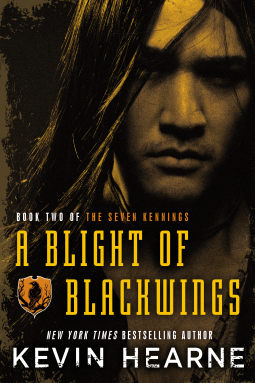 A Blight of Blackwings, by Kevin Hearne (Del Rey)
A Blight of Blackwings, by Kevin Hearne (Del Rey)This sequel to A Plague of Giants is as detailed and complex and just plain entrancing as the first volume. The war with the Bone Giants may be over, but the giants are anything but vanquished; their spies, invading forces, and menaces of various sorts, natural and magical, seek to weaken the surviving kingdoms. As before, magical gifts called “kennings” arise in certain people by way of life-threatening ordeals; once the kennings were thought to be only five, now a sixth (the ability to speak to animals, including insects, with predictably hilarious and dreadful results) has arisen – could there be more?
As before, the story is told primarily through a Bard, whose kenning allows him to adopt the appearance, voice, and verbatim tales of his subjects as he relates these songs and stories to the refugees from the Bone Giants war, gathered on Survivors Field. Each character knows only a small portion of the whole; each has his or her agenda, cultural context, affiliations, and personal biases. The effect is a bit like the classic movie, Rashomon, in which each character’s telling of the same events produces a radically different interpretation.
I loved the chance to spend more time with characters from very different cultures (and the utterly delightful portrait sketches). As before, with the first volume, I had favorites and in this installment was coaxed into widening the field.
The story ended on a cliff hanger, so I assume – no, I demandthat there will be more.

August 7, 2020
Special BayCon Zoom Panel!!
I'll be appearing with Juliette Wade and Janice Hardy Saturday August 8, at 11:15, discussing nurturing your career through adversity.
on Saturday, August 8th for our second virtual mini-convention! Hosted by BayCon on Zoom.As these challenging times continue, it's all the more important to stay engaged with your fandom and creativity. We are hoping another dose of programming will do the trick (or at the very least keep you craving more until the next BayCon). Details below:
11AM Saturday, August 8th, we will be hosting a live ZOOM conference.
Our tentative schedule (subject to change):
11:00 Opening
11:15 Nurturing Your Career.
Description: Today's authors face a daunting array of challenges, from dramatic shifts in traditional publishing to evolving marketing strategies to the loss of personal contact with colleagues, bookstores, and readers due to the pandemic. Four pro writers discuss strategies to not only survive but to flourish in this climate of uncertainty.
Deborah Ross, Juliette Wade, Janice Hardy
11:45 Stump the Experts
Mark Gelineau, Carrie Sessarego, Leslie Light, Wanda Kurtcu
12:15 Maya and Jeff Bohnhoff in concert
12:45 Flash Fiction with Thaddeus Howze and M. Todd Gallowglas
1:15 BayCon Charity Conversation with Larkin Street Youth
1:30 Community Guest of Honor Jean Batt Performance
1:40 Closing
Sign up link: https://docs.google.com/forms/d/e/1FAIpQLSeYIHMG3uLOb_z27Gnts3NEfeNJw2TQBuzPOAWRFCgcKbxpxQ/viewform
Due to Zoom restrictions, space is limited. If you are interested in watching this live, make sure to sign up ASAP. We will send out invitations with the link approximately 24 hours before the event.

Book Reviews: Transcending Disaster
With or Without You, by Caroline Leavitt (Algonquin)
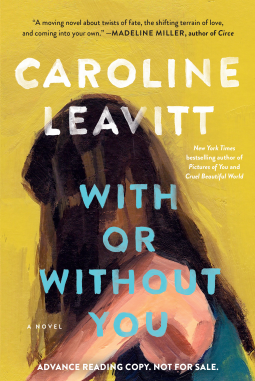
Several decades ago, I gave up on mainstream fiction. I’d read a few – a very few – of my favorite authors (Jodi Picoult comes to mind) but ignore the rest of the field. My reading plate was already filled with new released in my genre (by “my genre” I mean science fiction and fantasy, which I’ve written professionally since the early 1908s). I’d soured on one tedious, pretentious “real life” novel after another. Which is a roundabout way of saying either Boy, was I wrong, or Wow, the field has improved, or – and – Caroline Leavitt is a terrific writer by anyone’s standards, and With or Without You strikes the perfect balance between deep, compelling characters, thoughtfulness and compassion, and quietly sane page-turning.
We think of a “page turner” as a book so gripping that we simply cannot put it down, and generally that means action adventure, thriller, horror, that sort of thing. It requires heart-pounding adrenalin, do-or-die tension, and astronomically high stakes, aka the fate-of-the-world-at-risk. A story of the mostly interior lives of characters, especially when pacing mirrors the way people actually change and grow and adapt, seems pretty tame stuff. In Caroline Leavitt’s supremely skillful hands, however, the story is anything but tame.
From the very first page, in which a married couple, once deeply in love and now increasingly at odds, have yet another argument, I wanted to know what would happen next. What struck me was that Simon, a musician, and Stella, a nurse, lived as if their love could and would solve all their problems. The present circumstance is yet another occasion for Simon to revive his band’s failing career with a gig across the country, and for Stella to stay home and even start a family. Their fight reminded me of times in my own relationships when the intoxication of love gave the illusion of clear communication, especially about difficult issues. There’s no question of the depth of Stella and Simon’s love for one another or the richness of their history together. But they have never learned to “fight fair” and wrestle their way to compromises that work for both of them: someone, usually Stella, always gives in. So when Simon suggests a return to a bonding experience that worked in their early years – taking drugs together – Stella gives in, even though she has been drinking alcohol and taking cold medicine. The combination of these with the unknown drug Simon provides puts Stella into a coma, and there is no assurance she will ever wake up. Or if she does, how she will be changed. Neither Simon nor Libby, Stella’s best friend and physician, will ever be the same.
I won’t say much more about what happens next because a big chunk of my enjoyment of this book was notknowing how it would all unfold. Suffice it to say, there were twists and unexpected turns, moments I cheered and others when I felt downcast along with the principal characters. I read on, engrossed, until the very (and very satisfying) end. And then wanted to talk about the book, to reflect on the ways we hurt the people we love, how we survive disasters together and alone, and how kindness may not bring closeness, but it makes even terrible events endurable. In short, the brilliant story-telling of With or Without You created connections between the characters and my own life, and rich fodder for reflection.
Which, in the end, is what fiction does best.

August 5, 2020
Short Book Reviews: Superb Political Fantasy
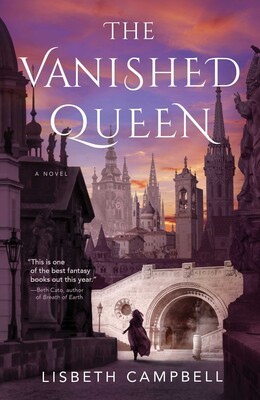 The Vanished Queen, by Lisbeth Campbell (Saga) presents a fiercely intelligent political drama in a fantasy kingdom dominated by a pathological sadist. The queen of the title was his wife, who was systematically tortured, separated from her sons, and then gone missing, “Disappeared,” presumed dead at his hands. One of the king’s cruelest acts was to do everything in his power to make the boys as brutal and insensitive as he is. A decade later, a resistance movement is gaining momentum, fueled by international intrigue and the king’s own increasingly desperate, ruthless suppression. One of the resistance fighters, a former student now a law clerk, discovers the queen’s diary in a boarded-up library, and the two time lines unfold and intersect.
The Vanished Queen, by Lisbeth Campbell (Saga) presents a fiercely intelligent political drama in a fantasy kingdom dominated by a pathological sadist. The queen of the title was his wife, who was systematically tortured, separated from her sons, and then gone missing, “Disappeared,” presumed dead at his hands. One of the king’s cruelest acts was to do everything in his power to make the boys as brutal and insensitive as he is. A decade later, a resistance movement is gaining momentum, fueled by international intrigue and the king’s own increasingly desperate, ruthless suppression. One of the resistance fighters, a former student now a law clerk, discovers the queen’s diary in a boarded-up library, and the two time lines unfold and intersect.What sets The Vanquished Queen head and shoulders above other fantasy novels is the intricate, pitch-perfect depiction of its characters, struggling to hold on to their humanity in a world that polarizes and debases even those with the best motives. These are smart, incredibly astute players who are all too often faced with impossible choices, both personal and political.
Campbell respects her readers, giving us everything we need to piece together the story without condescension or emotional manipulation. We are free to draw our own conclusions about complex, often ambivalent situations. With subtlety and exquisite skill, Campbell takes us on a journey through a series of moral and emotional conundrums: how is it possible to be a good person in a world where survival means doing evil deeds? When does a person become truly unforgivable, beyond redemption? And what is the place of love in such a world?

August 3, 2020
[political rant] Right Wing Media, Disinformation, and the Pandemic
 I don't often post political stuff here on my blog. My readers may remember the series of posts, "In Troubled Times," as I walked/crawled/screamed through my reactions to the unfolding events of the 2016 election. A more current version would be entitled, "In Perilous Times," and has been on my mind. To get the discussion started, here are some thoughts on how the right-wing media and conspiracy theorists spread disinformation that resulted in a much worse pandemic in the US.
I don't often post political stuff here on my blog. My readers may remember the series of posts, "In Troubled Times," as I walked/crawled/screamed through my reactions to the unfolding events of the 2016 election. A more current version would be entitled, "In Perilous Times," and has been on my mind. To get the discussion started, here are some thoughts on how the right-wing media and conspiracy theorists spread disinformation that resulted in a much worse pandemic in the US.From The New York Times 7/28 morning report:
Why is the U.S. enduring a far more severe virus outbreak than any other rich country?There are multiple causes, but one of them is the size and strength of right-wing media organizations that frequently broadcast falsehoods. The result is confusion among many Americans about scientific facts that are widely accepted, across the political spectrum, in other countries.Canada, Japan and much of Europe have no equivalent to Sinclair — whose local newscasts reach about 40 percent of Americans — or Fox News. Germany and France have widely read blogs that promote conspiracy theories. “But none of them have the reach and the funding of Fox or Sinclair,” Monika Pronczuk, a Times reporter based in Europe, told me.Fox is particularly important, because it has also influenced President Trump’s response to the virus, which has been slower and less consistent than that of many other world leaders. “Trump repeatedly failed to act to tame the spread, even though that would have helped him politically,” The Washington Post’s Greg Sargent has written. The headline on Sargent’s opinion column is: “How Fox News may be destroying Trump’s re-election hopes.”Another factor creating confusion: The lack of an aggressive response to virus misinformation from Facebook and YouTube. Judd Legum, author of the Popular Information newsletter, has identified some of this misinformation, and the two companies have responded by removing the posts he cited. But Legum told me he had pointed out only a small fraction of the false information, and the companies had done relatively little to remove it proactively.Twitter took a slightly more aggressive step yesterday, putting temporary limits on the account of Donald Trump Jr. after he shared the false Breitbart video.

July 31, 2020
Short Book Reviews: A Reincarnated Chimera
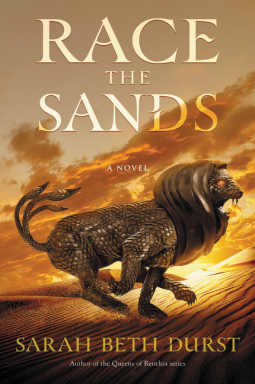 Race the Sands, by Sarah Beth Durst (Harper Voyager)
Race the Sands, by Sarah Beth Durst (Harper Voyager)I loved this world, in which Becar, a precarious desert kingdom, politics are based on karmic “readings” by Muses of a person’s past lives. The stressed, disenfranchised populace is distracted by races involving vicious, mindlessly destructive chimeric monsters called kehoks, the reincarnated souls of those so evil and depraved as to be beyond hope. When the King dies at a youthful age and quite unexpectedly, his brother cannot take the throne until the King’s spirit is identified, presumably in a traditionally noble beast. The search intensifies as neighboring kingdoms scent weakness and prepare for an invasion. Unstable conditions like this form the perfect settings for taut, dynamic stories, don’t they?
Enter a failed Muse student who finds a new life as an apprentice jockey, a woman who trains racing monsters to pay her daughter’s tuition at Muse academy, her patroness, a socialite with a flair for politics, a Muse agent charged with locating the King’s spirit, and assorted other characters. What links them together with the Prince is the black-iron lion, a kehok even more volatile and dangerous – and intelligent -- than others of his kind. With him, the trainer and her new apprentice jockey have a chance to win the grand championship, and with it, financial security and independence. With war brewing and the search for the King’s spirit intensifying, with their rivals resorting to ever more desperate sabotage, it’s a race against time as well.
An added delight was the effortless skill with which Durst moved from inner to outer action, her subtle handling of tension, her compassionate portrayal of her characters and their situations, and her imaginative magic. Recommended for adult as well as YA readers.

July 24, 2020
Short Book Reviews: From Sacrifice to Assassin
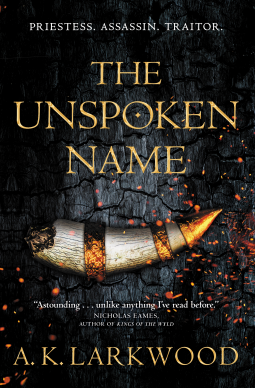 The Unspoken Name, by A. K. Larkwood (Tor)
The Unspoken Name, by A. K. Larkwood (Tor)I kept thinking of the worlds of Tolkien as I read this long, rich book. It seemed to be a series of related novels, each arc coming to a not-quite-resting place. The many worlds, linked by portals, were are much the focus as the characters themselves…until all the story threads were gathered together and then entire tapestry pattern emerged. I didn’t love every character or every world, but I was right with Csorwe, every step of the way.
“The Unspoken Name” refers to one of the many gods that inhabit the disparate worlds, in this case one whose name must never be uttered. Girls are brought to this god’s temple to study and serve in the hopes that one of them will become the Bride of the God, gifted with prophecy, living a pampered if drug-soaked life until she’s sacrificed in her fourteenth year. Csorwe is one such, fully prepared to die . . . until Belthandros Sethennai, a wizard who has petitioned her for answers, interrupts her journey to death with a question of his own: Do you want to die? Or do you want to come with me and create your own destiny?
Instead of complying with expectations, she runs away with him, accepts his training in martial arts, among other things, and ultimately becomes his bodyguard and hired assassin as he seeks to wrest control of his city from his usurper rival. That’s the initial movement in this many-act drama.
I loved that many of the characters aren’t human, Csorwe for example. She’s more orc-like, with “grey skin, grey freckles, yolk-yellow eyes, an overgrown mop of black hair,” … and tusks. Nobody from other races cares particularly. They just shrug and say, “She’s from Oshaar,” one of the many realms linked through the Serpent Gates. How great is that?

July 20, 2020
Author Interview: Helen Harper
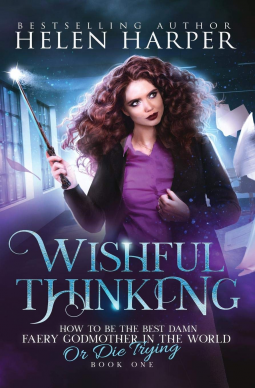 Today I chat with Helen Harper, author of the delightful fantasy, Wishful Thinking (How To Be The Best Damn Faery Godmother In The World (Or Die Trying), which I reviewed here.
Today I chat with Helen Harper, author of the delightful fantasy, Wishful Thinking (How To Be The Best Damn Faery Godmother In The World (Or Die Trying), which I reviewed here.Deborah J. Ross: Tell us a little about yourself. How did you come to be a writer?
Helen Harper: I always thought of myself as a reader rather than a writer. I grew upentirely immersed in books of all sorts, but fantasy was always myfavourite. In my early twenties I had vague notions of trying to writefor Mills and Boon but, when I tried to write something, I realised itwas far harder than I thought so I abandoned my efforts. Much later on,when I found myself under a great deal of stress at work, I discoveredthat writing was the perfect way to take a step back from life andimmerse myself in other worlds. Instead of slobbing out in front of thetelevision, I would write. I didn't have any plans to share what Iwrote. It was purely a release for myself. Nobody was more surprisedthan myself when I realised that not only had I managed to writecomplete books but that other people wanted to read them.
DJR: What inspires your books?HH: I'm a pantser rather than a plotter so I tend to make things up as I goalong. However, I always start with a germ of an idea that can come fromanywhere. With The Lazy Girl's Guide to Magic, it was a chat with a goodfriend about how we would make useless book heroines because we were toolazy. With Highland Magic, the ideas came from wondering about thedivide between the Highlands and the Lowlands of Scotland and theDreamweaver series was inspired by an article I read about adult nightterrors.
DJR: What authors have most influenced your writing? What about them do youfind inspiring?HH: I have very eclectic tastes so I think I'm probably influenced from allsorts of different authors. I enjoy a lot of crime fiction and thrillersand there are echoes from those authors in my own work, from MichaelConnelly to Stieg Larrsen. And then there are the Urban Fantasy greatswhose books I will read over and over again, such as Ilona Andrews,Patricia Briggs and Kelley Armstrong. The first true urban fantasyseries I ever read was Laurell K Hamilton's Anita Blake books. I was soblown away by the blend of thriller and fantasy which was set in a worldI could relate to that I think I'll always be influenced by thosestories.
DJR: Why do you write what you do, and how does your work differ from othersin your genre?HH: I always write strong heroines who are flawed in some way because, afterall, nobody is perfect and I love seeing how my characters can overcometheir own difficulties. When I started writing, it didn't seem as ifthere were many other authors who wrote Urban Fantasy books set in theUK so I felt in a small way that I was beating a (slightly!) new path. Idon't tend to follow trends in the market. I write the story and thecharacters who are the most insistent in my own head. I feel veryfortunate to be able to create stories for a living!
DJR: How does your writing process work?I think because I'm always primarily a reader, I write in the way that Iwould like to read, with no particular idea of what's coming next andwith scenes of romance or action or whatever as I'd like to read them. Igo for long walks at the start of each day where I work through variouspossibilities in my head and then head back home and write whateverscene feels the best. I have to admit that I'm not particularly good atdeleting ideas or removing scenes when I'm editing. Once the story iswritten down, to me it already seems almost too real to change.
DJR: What have you written recently? What lies ahead?HH My last series was a bit off the wall, where the main character was afaery godmother working in an office and with all the politics that youmight expect from an open plan workplace of that nature. I likedexploring the character of someone who's got all the power but isn'ttypically considered the hero of a story. My next series, however, isfar darker and much more typical of Urban Fantasy. It's about a womanwho's training to become a police detective and who gets involuntarilywrapped up in the world of vampires and werewolves. She is murdered atthe start of the book and then is reborn in flames and has to solve herown killing. It's quite thrilling!
DJR: What advice would you give an aspiring writer?HH: Read everything you can get your hands on!DJR: Great advice!
After teaching English literature in the UK, Japan and Malaysia, Helen
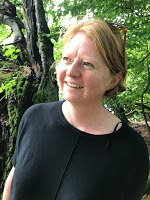 Harper left behind the world of education following the worldwidesuccess of her Blood Destiny series of books. She is a professionalmember of the Alliance of Independent Authors and writes full time,thanking her lucky stars every day that's she lucky enough to do so!Helen has always been a book lover, devouring science fiction andfantasy tales when she was a child growing up in Scotland.She currently lives in Devon in the UK with far too many cats – not tomention the dragons, fairies, demons, wizards and vampires that seem tokeep appearing from nowhere.
Harper left behind the world of education following the worldwidesuccess of her Blood Destiny series of books. She is a professionalmember of the Alliance of Independent Authors and writes full time,thanking her lucky stars every day that's she lucky enough to do so!Helen has always been a book lover, devouring science fiction andfantasy tales when she was a child growing up in Scotland.She currently lives in Devon in the UK with far too many cats – not tomention the dragons, fairies, demons, wizards and vampires that seem tokeep appearing from nowhere.



